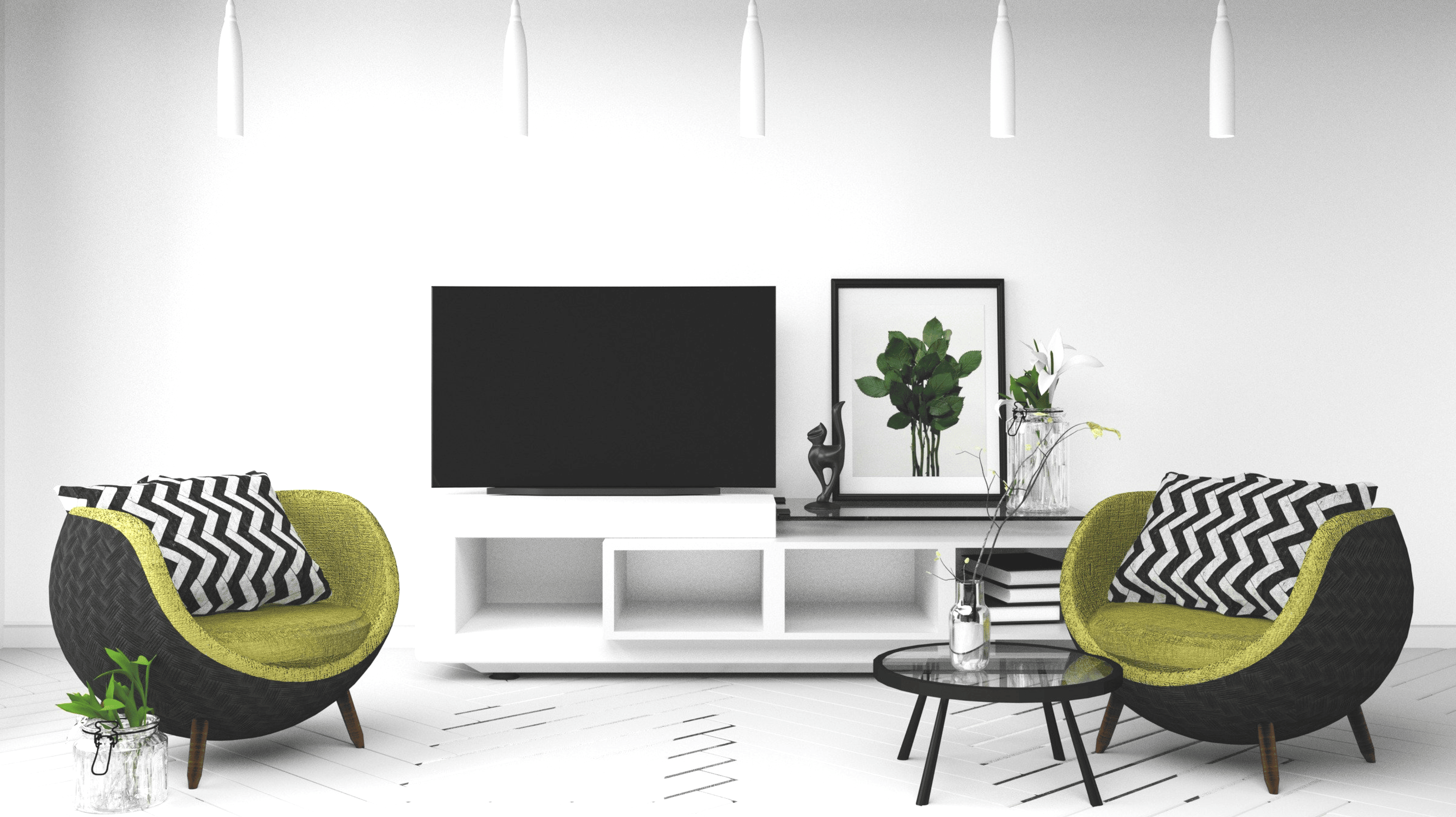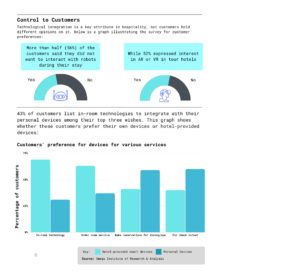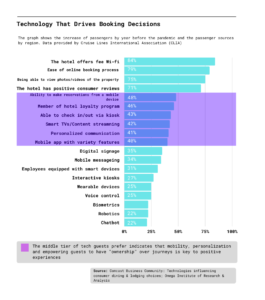- Industries
Industries
- Functions
Functions
- Insights
Insights
- Careers
Careers
- About Us
- Hospitality
- By Omega Team

A smart room uses IoT (Internet of Things) to enable devices and systems to communicate with each other to provide added-value functionality such as voice control, automation or energy efficiency.
Automated Smart Room Controls
Smart home automation devices connect appliances, switches, and gadgets to a central hub, enabling you to control those devices in secure and convenient ways. For example, evolve delivers a fully integrated, seamless control and monitoring system that provides occupancy-based energy management, in-room lighting controls and guest room automation including shading and drapery to create memorable guest experiences while reducing energy and operational costs.
Another example is Electric Mirror which has developed the Savvy SmartMirror which has AI (Artificial Intelligence) voice incorporated into it, showcasing the hotel’s amenities as well as a control panel for interacting with the smart room and in-room concierge.
Tablets
Guest room tablets can be embedded in each hotel guest room which provides functions and amenities like temperature, lights, entertainment controls, blinds, meal delivery, spa services and more into one easy-to-navigate (and easy-to-purchase) interface.
However, hotels do not necessarily need to prepare their own tablets. As Bring Your Own Device (BYOD) become popular, hotels should beware of this trend and develop strategies to enable customers to experience the same experience by using their own devices. Exhibit 1 shows how the customers view and utilize smart in-room services through devices.

Guestroom Television
Hospitality TVs are more than just channels, they are smart hubs for the guest experience, branding and communications. From controlling lights to streaming content and ordering room service, the hotel TV has adapted alongside guest expectations. Today’s guests are used to having top-notch tech at home and have begun to expect more from the hotel experience. The core elements that the guests want are flexibility, control and simplicity.
Hospitality Tech’s 2019 Guest Engagement Technology study found that 72% of guests would return to a property when the tech they want is available. The right entertainment options are also important to guests: 40% of those same respondents said that Smart TVs and content streaming were a top consideration when choosing a hotel. Guests in different types of hotels have different demands, but nearly 75% of guests use in-room entertainment, and 28% said it is “very or extremely important” to their overall hotel experience. Guests prioritize modern in-room hotel technology so much that they would be willing to forgo amenities like a business center (34%), a fitness center (27%), spa (24%), or room service (15%). For in-room technology specifically, most guests wanted to use TVs provided by the hotel (69%) versus their own devices (31%).
Platforms like Monscierge’s Apple TV for hospitality are becoming increasingly popular since they enable guests to stream their own content. Apple TV for hospitality has dedicated guest functionality like automatically logging out accounts upon checkout via PMS integration and displaying hotel information and branding on guest TVs.
Hilton’s Connected Room is a smart room program which enables guests to personalize and control every aspect of their stay from one central point – their mobile device. Now they have developed a partnership with Netflix. Guests without a Netflix account will be able to sign up on the spot in their room and start watching immediately, while current Netflix members can start watching exactly where they left off before checking in. Guests who prefer to use the Hilton Honors app can download it onto their mobile device if they haven’t already, then add Netflix and other streaming media providers and TV channels to their list of “favorites” for easy access. Guests who prefer the TV remote can press the remote’s “Netflix” button, which powers on the TV and goes directly to the Netflix login screen. Guests will also be able to set various preferences in their Hilton Honors account profile to further customize their in-room experience to their individual preferences. In terms of bringing that vision to fruition, the Netflix partnership would seem to be a step in the right direction.
Virtual Concierge Robot
A digital concierge and virtual concierge is a type of artificial intelligence that can be used to provide assistance to hotel guests. It can benefit the hospitality industry by creating a seamless customer journey from the pre-booking phase through to the post-stay.
In-room digital concierge-type services are becoming popular. Alibaba in China has created a robot porter for carrying items around hotels, called Space Egg. Integrated with an Alexa-like AI assistant called Tmall Genie, guests can use voice commands to order items delivered by Space Egg. Aloft hotels by Marriott has been using a robot porter since 2014 to help the front desk staff respond more quickly to guest queries.
Voice Assistants
The demand for in-room voice-activated digital assistants continues to grow exponentially, not only for their ability to put safety-critical distance between hotel guests and staff but because they eliminate physical touchpoints in guestrooms and efficiently deliver personal service at scale, a requirement at properties operating with limited staff.
Amazon’s voice assistant Alexa has been launched in hotels, called Alexa for hospitality. This system can be customized to include key guest information and control smart hotel room functions. Volara, another example, is used for housekeeping to quickly confirm that a room is cleaned and ready.
Interactive Walls and Tables
Interactive walls and dining tables are emerging at hotels, restaurants, fast food eateries and unexpected hospitality and tourism venues, including cruise ships. High-tech innovators are designing these digital and projector-driven surfaces to delight and inform guests while also automating hospitality work such as wait staff duties and concierge services.
The application of intelligent tables greatly reduces the workload of waiters and improves customer satisfaction. People can even play various kinds of games at the table. With labor costs rising, restaurants are happy to experiment with the technology. Meanwhile, the wall screens of the Renaissance New York Midtown Hotel have taken millennial love of interactive technology to a new level, with motion detectors, projectors, 3D cameras and reflective paper in the design. Interactive map walls at Britain’s Premier Inn Hub hotels allow guests to activate information about specific neighborhoods by aiming smartphones at those portions of the map.
Future Outlook
This article introduces different technologies and applications options. Partnerships between hotel, entertainment and technology companies will be a big trend. New ideas will be applied to each hotel to form their competitive advantage and bring fresh experiences to customers. According to surveys, customers are increasingly demanding for various types of technologies applied in the hotels, shown in exhibition 2. Especially in the U.S., hoteliers are increasingly looking to automate guest rooms. Every practitioner in the industry can’t ignore the benefits smart rooms bring. In the future, we will witness the introduction of more technologies to enrich our travel and stay experience.

Subscribe
Select topics and stay current with our latest insights
- Functions